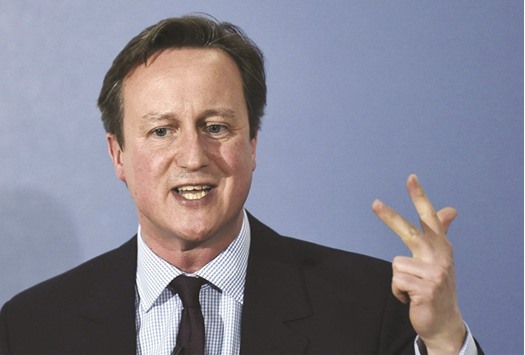The British military will lift the ban on women serving in combat roles later this year, the defence ministry said yesterday in what Prime Minister David Cameron hailed as a “major step”.
The announcement follows a review into whether women are physically strong enough to serve with the infantry, and whether their presence poses a risk to the cohesion of military units.
The decision, which will gradually be implemented over the next three years, comes after the US dropped its official ban on women in combat in January.
“The chief of general staff has recommended that we lift the ban on women in ground close combat, a view that has been supported by the other service chiefs,” Cameron said in the statement.
“I agree with his advice and have accepted his recommendation. I have asked that this is implemented as soon as possible.”
From November, women will be able to join the Royal Armoured Corps, operating tanks and other vehicles.
Cameron said it was a “major step” and meant the armed forces could “make the most of all its talent”. But the army’s research suggests fewer than 5% of its 7,000 women would pass the current infantry fitness test.
Concern over the issue had centred on whether women had the physical capability to withstand the demands on their body that some of the roles will require.
One of the easier tests for the infantry, for example, involves recruits completing an eight-mile march in under two hours while carrying a backpack weighing 55lbs (25kg).
The ministry of defence is expecting a spike in applications.
By the end of 2018, the infantry, Royal Marines and Royal Air Force (RAF) Regiment — a specialist airfield defence corps — will all be open to women.
“It is vital that our armed forces are world class and reflect the society we live in. Lifting this ban is a major step,” Cameron said, in an announcement made as he attended a Nato summit in Warsaw.
“It will ensure the armed forces can make the most of all their talent and increase opportunities for women to serve in the full range of roles.”
Women currently account for about 10% of British military personnel.
General Nick Carter, the head of the British army, said he was “delighted” at the lifting of the ban.
“Women already operate on the frontline in a variety of roles and have done so with distinction in recent conflicts,” he said.
Defence Secretary Michael Fallon has previously said he hoped to “open up combat roles to women” in 2016, saying roles “should be determined by ability and not gender”.
Fallon ordered an 18-month review of training procedures and the physical demands of fighting to ensure the change can be made without damaging female soldiers’ health.

